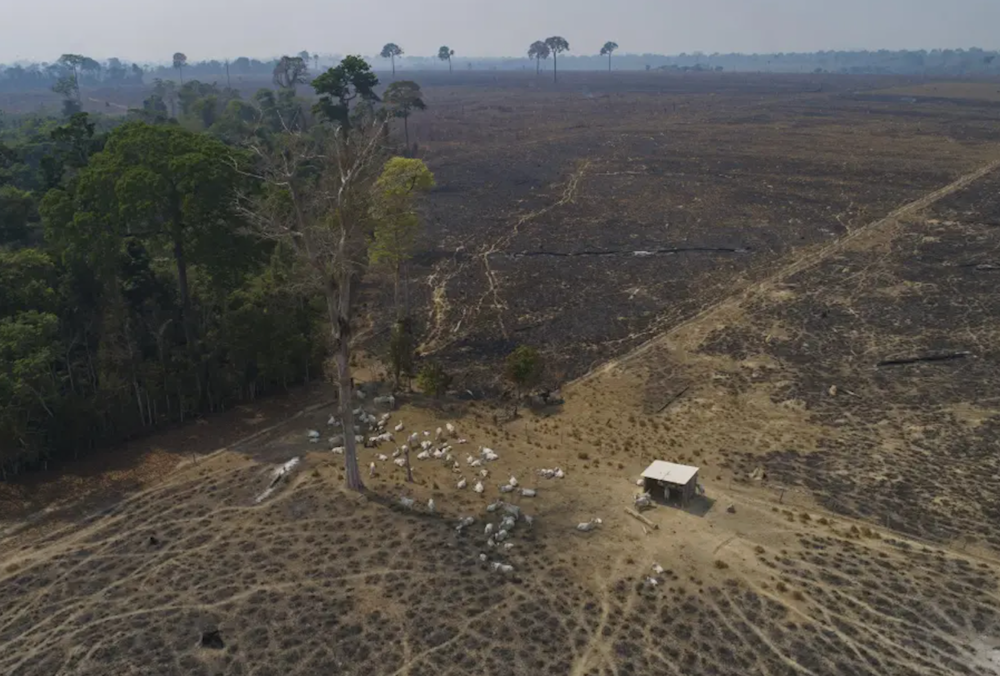Brazil rancher to pay $50 mln for damaging Amazon rainforest
Recent research has found that half of the Amazon rainforest may reach a tipping point by 2050.
-

Cattle graze on land recently burned and deforested by cattle farmers near Novo Progresso, Para State, Brazil, on August 23, 2020. (AP)
A Brazilian cattle rancher has been forced to pay more than $50 million for destroying a portion of the Amazon rainforest and to rebuild the valuable carbon sink.
Last Monday, a Brazilian federal court seized Dirceu Kruger's assets to compensate for the climatic harm he created via unlawful deforestation. The complaint was brought on behalf of the Brazilian Institute of Environment and Renewable Natural Resources (IBAMA). It is the greatest civil lawsuit initiated for climate crimes in Brazil to date, and it marks the beginning of a judicial campaign to remedy and prevent rainforest harm.
IBAMA had already ordered Kruger to pay damages after damaging 5,600 hectares (13,838 acres) in the Amazonian communities of Boca do Acre and Lábrea. This occurred on federal and state-owned public property in Amazonas.
The rancher used chainsaws to cut undergrowth, then ignited fires to clean the field before planting grass to create pasture for cattle. Satellite photographs revealed the extent of the destruction, and Kruger acknowledged causing it on film.
The Amazon rainforest is critical to the global climate system, yet it is badly threatened by both legal and illicit activity; recent research found that half of it may reach a tipping point by 2050.
Claims against Kruger include that he harmed the climate in two ways: buying vegetation directly and destroying trees, stopping them from absorbing carbon dioxide from the atmosphere.
The court heard that harming the Amazon rainforest releases an average of 161 tons of carbon per acre, for a total of 901,600 tons.
The total harm is evaluated at $65 ton based on an average of the US Environmental Protection Agency's and the Organization for Economic Cooperation and Development's (OECD) social cost of carbon calculations. Recent estimates indicate costs are far greater.
Damage created can 'never be repaired'
Kruger's assets have been frozen, and he is barred from obtaining government financing or tax breaks as well as selling livestock or agricultural goods and machinery like chainsaws and tractors.
Furthermore, Kruger must rehabilitate the damaged land so that it may once again serve as a useful carbon sink. The court stated that having offenders pay compensation for climate harm is critical since the damage created can never be repaired.
This was Brazil's attorney general's office's largest claim to date for rainforest damage, and it was meant to be "just the first of a series of actions that seek to repair the climate damage caused by the destruction not only of the Amazon but of all Brazilian biomes".
Mariana Cirne of the National Prosecutor's Office for Climate and Environmental Defense stated that the case's outcome was "a matter of climate justice" and would assist Brazil fulfill its national emission objectives.
The ruling has yet to be finalized by the court and may yet be challenged. Several similar lawsuits are making their way through Brazil's court system. The lawsuits are not limited to those who actively harm the Amazon rainforest. Importação e Exportação de Madeiras Floresta Verde faces a lawsuit for allegedly hoarding timber from unlawful deforestation.
Rafaela Santos Martins da Rosa, a federal judge, stated that quantifying the overall social cost of this destruction serves to dissuade future illicit action.
The court emphasized that the Kruger verdict did not allow for allegations of legal deforestation, but da Rosa stated that civil proceedings of this nature might be taken against public officials.
Brazil's federal government was ordered to reestablish a strategy to prevent and manage deforestation in the Amazon early this year, as well as monitor and investigate environmental crimes.
The court acknowledged that Brazil's environmental policy was still being modified following the election of Luiz Inácio Lula da Silva in 2022, but noted that more might be done.

 4 Min Read
4 Min Read








